Our Story Your Story is an inter-generational performance project featuring the stories South Africans living in local townships. The project gives voice to the stories of “average” black South Africans who lived through apartheid, or who have grown up in the shadow of apartheid’s effects. Through OSYS elders and youth have an opportunity to forge relationships, build community and learn from the personal experiences of other participants.
Here’s the full “official” description of the project:
In 2014, South Africa celebrates 20 years of democracy.
To commemorate this occasion, Clowns Without Borders (www.cwbsa.org) is initiating on an intergenerational storytelling project called OUR STORY YOUR STORY.
This project will create a platform for at-risk youth and senior citizens to tell their true-life stories about life during the Apartheid and post-Apartheid era. Its aims are to promote safe communities, intergenerational connection, personal and community healing, and involvement in the democratic process.
We will be implementing this project in the Nyanga township of Cape Town, an area with one of the highest crime rates in South Africa. It is our hope that we can then use this pilot to springboard other similar projects that work with marginalised or at-risk communities throughout the region.
Funded by Rand Merchant Bank, OUR STORY YOUR STORY will work with 2 groups of participants from Nyanga: seniors from Ikamva Labantu’s senior clubs (www.ikamva.com) and youth from Safety Lab’s Nyanga Yethu Project (www.safetylab.co.za).
From February to April 2014, we will engage participants in a 12-session interactive storytelling process. They will be guided to identify personal narratives, craft them into stories, and share them for an audience.
OUR STORY YOUR STORY will culminate in 3 community events in Cape Town for the public. At these events, there will be an opportunity for the audience to share their own personal stories as well.
4/1/14
One of our workshop participants, an “at risk” youth from the Townships, wrote this poem and surprised us with it at our final story performance. Enjoy!
Click here to hear Ntsika’s Poem
3/31/14
3/15/14
Warmups! Elders and Youth
Here’s a short video of our class warm ups. As you can see, we are very serious people making very serious art.
3/8/13
The Elders of Our Story Your Story (OSYS)
(This post also appears under the “personal” page on this website.)
Our last session with the elders was extraordinary. So, instead of blathering on about myself, here’s a snapshot of the stories that they will be sharing in our performance.
The first is from a woman named Khuselwa:
During apartheid, blacks were required to carry government issued i.d. papers, or “passes,” at all times. If they didn’t have their passes with them, these citizens could be arrested and thrown in jail.
As a young woman, Khuselwa didn’t have a pass. Thankfully, her husband did, so when they moved to Cape Town, he was able to secure them housing. He also found a job for Khuselwa as a domestic worker for a white family.
One day on her way to work, a police officer stopped Khuselwa. She panicked, and fumbled about, pretending she had lost or misplaced her identity papers in the hopes that the officer would take pity on her and let her go. Instead, he arrested her with several others, and threw her in jail.
The prison was awful. In the twelve hours that she was detained, she was only offered a old piece of brown bread and a cup of water. Khuselwa vowed she would sleep standing up if need be, because the floor of the prison was filthy.
In those long hours, she was also panicked. Khuselwa had her employer’s house keys. How would she get word to them that she would not be at work, and would not have dinner prepared when they arrived home? Moreover, how would she get word to her husband that she was in prison, and he needed to help secure her release?
Fortunately, another prisoner who had been released, found her husband and told him the situation. He was able to negotiate Khuselwa’s freedom. Luckily, she was able to keep her job despite her absence that day.
Once Khuselwa shared her story, others told similar tales.
Edith was detained on her way to school. She was just a young girl, but still the police demanded papers. She was eventually released and allowed to continue to school if she told the principal that he must announce to all students that if they were fifteen years or older, they must register for a pass.
Other participants told of police raids on private homes. Officers would come at any hour of the day or night and search homes for contraband. Police ripped these homes apart, leaving dwellings and property in disarray. They would even confiscate cutlery because knives and forks could be used as “weapons.” Families were left to eat only with spoons.
One woman told the story of a police raid that occurred in her neighborhood in the middle of the night. Her elderly neighbor had gone to bed naked. The woman was roused by a furious knock at her door and the bright light of the officer’s flashlight. The knocking and light convinced her that a fire had broken out, and the neighbors were awakening her so she could find safety. (Fires often broke out in the densely packed shacks, and several homes would be consumed in minutes.) When faced with a naked, screaming old lady, the officer was horrified. He directed her to go back inside and cover up. He no longer wanted to search the home, and urged the woman to return to bed. But the woman was so confused she continued to howl, and her cries awoke the neighbors who witnessed the officer’s humiliation.
Those are just some of the stories we heard in our most-recent class.
Working on storytelling in the townships is both a joy and an honor. South Africa is a young democracy, and it is still birthing a culture where every person’s voice can be valued and heard. As South Africa (or any democracy) moves forward, we must support giving public acknowledgement to the full range of citizens’ experience.
Hopefully YSOS can help promote a democracy of narrative—in which the community wheelhouse of stories becomes more-representative of the diverse range of community voices. There are widely-available accounts of apartheid from educated whites; power and privilege have afforded their voices to be heard. We have also heard from non-white leaders on the forefront of the anti-apartheid fight. But we hope to create a platform for the “average” person’s stories. Hopefully OSYS can preserve and disseminate at least some of these stories, so that the experience and wisdom of these elders remain available to future generations. These memories can help future generations better understand their own history and identity.
We are lucky to work with the elders in their last decades, so that their beautiful first-hand accounts of South African life are not lost when they are gone. We are honored to have the opportunity to remind them that their stories are important. We are privileged to be in a position to support them in remembering their past, and sharing their experience. I know their stories have certainly encouraged me to reflect on my personal history, my country’s history, and my own experience in the U.S.’s democracy.
Mostly, though, I feel lucky to now call these elders my friends.
If you want to know more about YSOS and Clowns Without Borders, or if you’d like to make a donation, please go to www.cwbsa.org.
2/23/14 (This post also appears under my “Personal” tab.)
Day 1 in the Townships
Tuesday morning, Lisa picks me up to drive into the townships. We will be meeting with the senior club and the planning coordinators for the youth program.
As we drive into the townships we quickly get lost. Not all streets are marked, and street names change often. Lisa pulls over and asks directions from a well-dressed young man on the sidewalk. He shakes his head, “You are very far from where you want to be.”
He offers to direct us if we can drop him near a taxi pick up. Lisa pauses, takes a deep breath, and says, “Yes, alright. Hop in.”
The young man introduces himself as Patrick. After Lisa and I tell him our names, Lisa asks, “Is Patrick your real name? Do you have a Xhosa name?”
“Yes,” he smiles, and says it slowly. I try, in vain, to repeat it. (I would share it with you here, but the string of sounds is too unfamiliar for me to recall.) Seeing my furrowed brow, he laughs, “Patrick will be easier for you to remember.”
Lisa asks him, “Where are you going?” It’s early morning, and from his formal clothes we guess he’s on his way to work.
“Gardens,” replies Patrick, referring to an upscale neighborhood in Cape Town.
“Oh,” smiles Lisa. “We just came from there.”
As the young man successfully directs us to the crèche where we will be working, he warns us, “You were very lucky you ran into me. You were driving through a tik neighborhood.” Lisa asks me if I know what “tik” is. I shake my head. Patrick explains, “It is a bit like what people in the U.S. call crystal meth.”
Before Lisa drops him at a filling station to catch a taxi, Patrick leaves us with a brochure for the NGO he works for in Cape Town. As he shuts the door, she says, “I was a bit nervous to let him in the car, but my gut said to trust him. We have angels watching over us. We’re lucky we got his help.” Then she cocks her head, “That happens a lot with this work. It’s as though something is watching over us and keeping us safe.” Then she flips the door locks and drives us back to the crèche.
Walking into the senior center, we are greeted by Nolathando (no-la-TAWN-doo), the group facilitator. She’s a short, grandmotherly woman with a mischievous smile and twinkling eyes. She greets Lisa warmly, as they know each other from a previous project. Nolathando will be our liason to the seniors for the duration of the project. We are hoping she joins the class as well.
“They are late,” Nolathando announces. “Their transport is not always on time.”
When the elders finally join us, they shuffle in and take seats at long tables. “First we have tea and porridge. Then you will explain your program.”
One of the women approaches Nolathondo and tells her something in Xhosa. “Ah,” she nods, “They would like to begin with a prayer.”
We stand, and one woman begins a call-and-response song in a deep, strong alto. The room swells with twenty voices as the elders join her call. The song rises for several minutes, switching leaders as the hymn progresses. I join the best I can, despite my linguistic limitations. When a grey haired woman dances, I join the others who clap and sway. Near the end, the elders begin shaking hands with each member of the group. Occasionally a warm smile transforms a handshake to a hug. I think of my Catholic background where, during services, we would shake hands and “share the sign of peace.”
Wouldn’t it be nice to begin each day with a practice like this?
After porridge and tea, we describe our storytelling workshop to the elders. At the end of our presentation, Lisa asks the group if there are any questions. One woman inquires, “Can we tell a story that is not ours, but is a good story for people to learn from?” Lisa and I explain that, while all stories have merit, our workshop will focus on personal narrative. Several seniors look at us in confusion. I interject, “Let me show you what we will be doing in our class.” Then I stand to share one of my own stories.
As I stand, I’m overwhelmed with feelings of inadequacy. What if they don’t like me? What if they think my story is stupid? What if they think I’m strange? Incompetent? Dull? Annoying?
What if no one signs up for the workshop?
But there is no turning back now.
I offer a silent prayer: “Dear God, please let my story be good enough. And if it sucks, please let them magically think it’s good so the elders still sign up.” Then I take a deep breath, and try to drop into my presence, vulnerability and authenticity.
As I speak, though, I find that I have nothing to worry about. The seniors are rapt. Perhaps they are being polite, but I swear that when my voice cracks with emotion, several elders nod and vocalize in empathy. With each nod and throaty rumble, my body relaxes and my heart opens. By the end, I am not grateful to be done, but grateful for the opportunity to share my story with the group that so generously shared their songs of prayer with me.
Two days later, Nolathando tells us that the workshop sign up is complete. Our class is full.
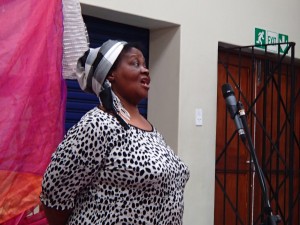
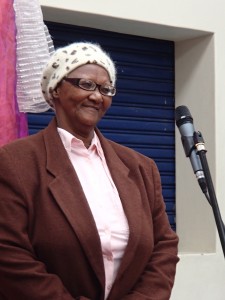
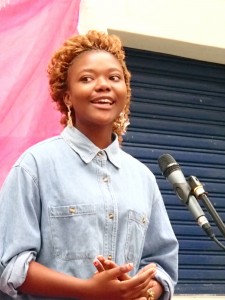
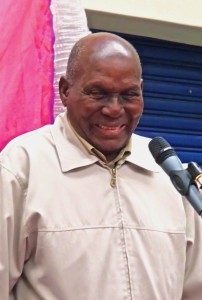
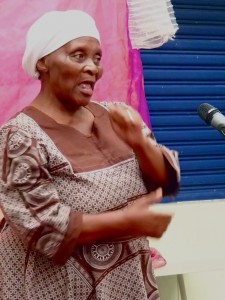
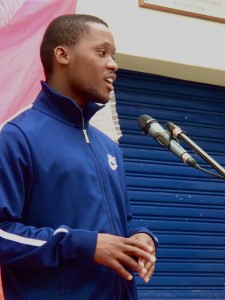
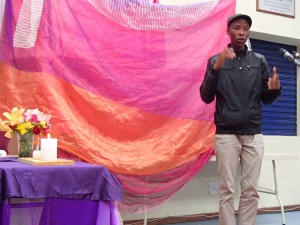
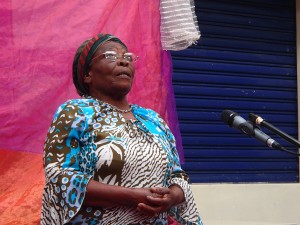
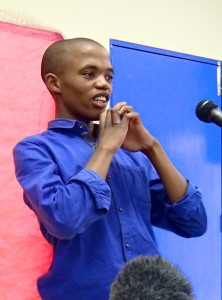
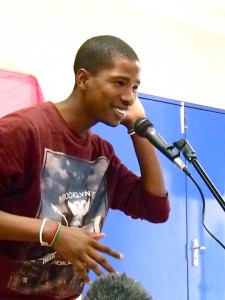
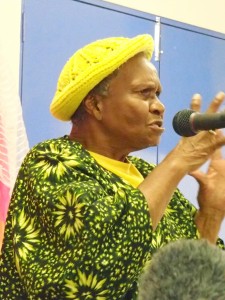
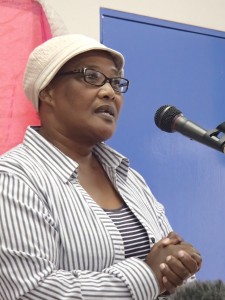
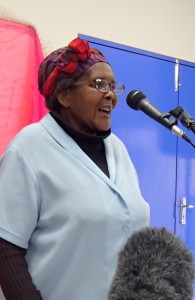
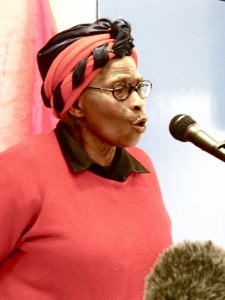
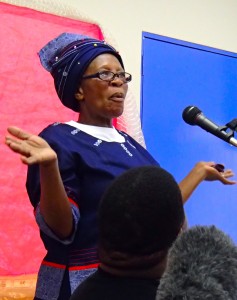
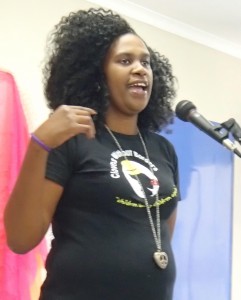
I had the pleasure of meeting you at the MSP Airport as you were heading out on your grand adventure. I look forward to reading about all the adventures you have. Have fun and thanks for the inspiration!!!
Hi Jeffrey, Thanks so much for your interest. I must say, you’re the friendliest airport handler I’ve met, and I’ve been to a LOT of airports. I imagine you make a lot of friends as they alight on adventures. Thanks for the sweet send-off to South Africa. I hope the updates provide you with a little inspiration!